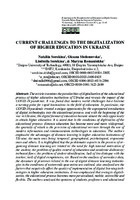Current challenges to the digitalization of higher education in Ukraine
Fecha
2022Autor
Sorokina, Nataliia
Shelomovska, Oksana
Sorokina, Lіudmila
Romaniukha, Maryna
Metadatos
Mostrar el registro completo del ítemResumen
The article examines the peculiarities of digitalization of the educational process of higher education institutions of Ukraine and reveals the impact of the COVID-19 pandemic. It was found that modern world challenges have become a turning point for rapid innovations in the field of education. In particular, the COVID-19 pandemic created a unique opportunity for the unprepared introduction of digital technologies into the educational process, and with the beginning of the war in Ukraine, the digital format of education became almost the only opportunity to obtain higher education. It is noted that in the conditions of digitization of the educational process, distance education has become more and more widespread, the specialty of which is the provision of educational services through the use of modern information and communication technologies in education. The authors emphasize the advantages of distance learning in higher education institutions of Ukraine, the main ones being: temporal, geographical, psychological, ergonomic ones and others. It is highlighted that the problematic aspects in the process of organizing distance learning are related to: the need for high internal motivation of the student; the problem of quality control of education and academic dishonesty; technical flaws; the problem of student identification; lack of live dialogue with the teacher; lack of digital competences, etc. Based on the analysis of secondary data, the dynamics of processes related to the use of digital distance learning technologies in the conditions of nationwide quarantine are outlined; also analysed are the factors that negatively affect the quality of implementation of digital learning technologies in higher education institutions. It was emphasized that owing to digitalization, the educational process becomes more personalized, mobile, accessible and flexible. The authors analysed the opinions of students, professors and educational management in order to see the chronological development of e-learning all over Ukraine and in a particular city of Ukraine in the period 2020–2022. The general opinion in the dynamics is that the quality of e-learning is improving, however the local trends are that students need to improve self-management skills, they demand more practically-oriented tasks in digital mode which can potentially develop better digital competence to navigate through elaborate e-learning environments and feel more confident in learning as it is.

